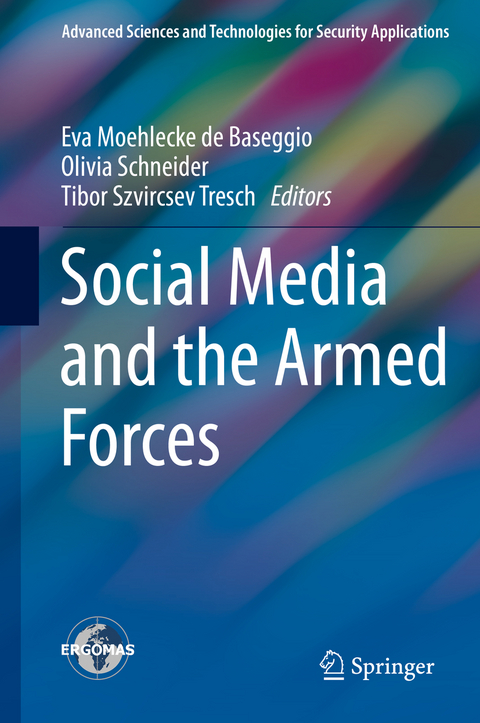
Social Media and the Armed Forces
Springer International Publishing (Verlag)
978-3-030-47510-9 (ISBN)
Social media has fundamentally changed communication and interaction in today's society. Apart from being used by individuals, it is also omnipresent in public sector organisations such as the armed forces.
This book examines the opportunities and risks associated with social media in the context of the armed forces from an international, social scientific perspective. It discuses the impact of social media in the everyday life of military personnel and analyses the extent to which social media influences their performance, be it as a distraction or as a source of perceived appreciation. It particularly highlights the representation of masculinity and femininity in military social media channels, since the way gender is portrayed on social media has an effect on how future recruits and - at the other end of the military career spectrum - veterans feel they are approached.
The book also focuses on the new form of follow-up discussion, which enables the armed forcesto interact with the population. On social media, the armed forces are publicly presented, and this shapes the public's opinions on them. Further, the armed forces can use debates as a monitoring tool of society's attitudes towards them or towards events that have an effect on society. Conversely, social media can lend a voice to military personnel, allowing them to be publicly heard.As discussions on social media can only be controlled to a limited extent, the context in which the armed forces are discussed alters their sphere of influence and potentially leads to a loss of control. An extreme example of this is the use of social media as a tool to strategically distribute misinformation in order to shape public opinion and threaten national security. Moreover, the use of social media to demoralise adversaries or to harm their credibility results in social media being considered a cyber weapon that affects politics and military activities.
Eva Moehlecke de Baseggio has been working as the project manager of the research project Social Media as Communication Channel of the Swiss Armed Forces at the Military Academy (MILAC) at ETH Zurich since 2016. She graduated from the University of Zurich with a Master's degree in Sociology and a minor in Popular Cultures. Olivia Schneider is a research assistant on the subject of social media at the Chair for Military Sociology at the Military Academy (MILAC) at ETH Zurich. In order to obtain her PhD at the University of Zurich, she analyses the public reporting on the Swiss Armed Forces as well as the communication of the organisation itself. She pays particular attention to the follow-up discussion and its deliberative quality. Tibor Szvircsev Tresch has been a lecturer in military sociology at the Military Academy (MILAC) at ETH Zurich (Swiss Federal Institute of Technology Zurich) since August 2008. Born in 1967 in Zug, Switzerland, he studied sociology, political science and criminology at the University of Zurich. Szvircsev Tresch received a doctorate from the University of Zurich in 2005 for his work "Europe's Changing Armed Forces: From Compulsory Military Service to Voluntary Armed Forces - An Empirical Study of European Armed Forces 1975-2003". From 2002 to 2006 he was an assistant lecturer in military sociology. From August 2006 to August 2007 he worked as a Senior Research Fellow at NATO Defense College in Rome. From September 2007 to July 2008, he worked as a research assistant at the Directorate for Security Policy (DSP) and conducted the research project "Challenges in recruiting military personnel in Europe: Lessons learned for Switzerland" at the Center for Security Studies, ETH Zurich. From 2008 to 2012 he was Secretary of the European Research Group on Military & Society (ERGOMAS) and since 2008 he is Working Group Coordinator of ERGOMAS Working Group on Recruitment & Retention.
Introduction.- Part I Social Media in the Everyday Life of Military Personnel.- Ubiquity with a Dark Side: Civil-Military Gaps in Social Media Usage.- Social Media Use at a U.S. Military Academy: Perceived Implications for Performance and Behavior.- The Need for Visibility: the Influence of Social Media Communication on Swiss Armed Forces Officers.- Part II Gender-Specific Representation on Social Media.- Managing Femininity through Visual Embodiment: The Portrayal of Women on the Instagram Accounts of the Swedish and the Swiss Armed Forces.- (Dis-)Empowered Military Masculinities? Recruitment of Veterans by PMSCs Through YouTube.- Part III Social Media Discussions as Insights into Public Opinion.- The Importance of Discussions on Social Media for the Armed Forces.- Debating German Special Forces: a Scandal in the Military, a Documentary, and a Thread.- Sentiment of Armed Forces Social Media Accounts in the United Kingdom: An Initial Analysis of Twitter Content.- A Transparent Network- Soldiers' Digital Resistance and Economic Unrest.- Part IV Risks and Dangers of Social Media.- The Dark Side of Interconnectivity: Social Media as a Cyber-Weapon?.- Misinformation and Disinformation in Social Media as the Pulse of Finnish National Security.- Social Media Use in Contemporary Armed Forces as a Mixed Blessing.
"This book is timely for a multitude of reasons. ... scholars in sociology and political science who study the military will benefit from reading it ... . Students attending professional military education courses and those in pre-commissioning programmes would also benefit from reading the book, especially the cross-national comparisons. ... senior military and defence leaders, as well as educators in professional military education institutions, would also benefit from reading this volume ... ." (Heidi A. Urben, Res Militaris, Vol. 11 (2), 2021)
“This book is timely for a multitude of reasons. … scholars in sociology and political science who study the military will benefit from reading it … . Students attending professional military education courses and those in pre-commissioning programmes would also benefit from reading the book, especially the cross-national comparisons. … senior military and defence leaders, as well as educators in professional military education institutions, would also benefit from reading this volume … .” (Heidi A. Urben, Res Militaris, Vol. 11 (2), 2021)
| Erscheinungsdatum | 10.09.2020 |
|---|---|
| Reihe/Serie | Advanced Sciences and Technologies for Security Applications |
| Zusatzinfo | XVII, 240 p. 24 illus., 22 illus. in color. |
| Verlagsort | Cham |
| Sprache | englisch |
| Maße | 155 x 235 mm |
| Gewicht | 546 g |
| Themenwelt | Sozialwissenschaften ► Politik / Verwaltung ► Vergleichende Politikwissenschaften |
| Schlagworte | cyber weapon • digital communication • Gender Diversity • Military personnel • Military recruitment • Western armed forces |
| ISBN-10 | 3-030-47510-7 / 3030475107 |
| ISBN-13 | 978-3-030-47510-9 / 9783030475109 |
| Zustand | Neuware |
| Informationen gemäß Produktsicherheitsverordnung (GPSR) | |
| Haben Sie eine Frage zum Produkt? |
aus dem Bereich


